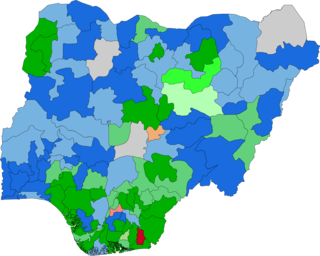
The Senate is the upper chamber of Nigeria's bicameral legislature, the National Assembly. The National Assembly is the nation's legislature and has the power to make laws, as summarized in chapter one, section four of the 1999 Constitution of Nigeria. The lower chamber is the House of Representatives.

Parliamentary elections were held in Nigeria on 20 February 1999, following the annulling of the 1998 elections. The result was a victory for the People's Democratic Party, which won 59 of the 109 Senate seats and 206 of the 360 House seats. Voter turnout was 42.1%.
The following lists events that happened during 2016 in Nigeria.
Events in the year 2017 in Nigeria.

General elections were held in Nigeria on 23 February 2019 to elect the President, Vice President, House of Representatives and the Senate. The elections had initially been scheduled for 16 February, but the Electoral Commission postponed the vote by a week at 03:00 on the original polling day, citing logistical challenges in getting electoral materials to polling stations on time. In some places, the vote was delayed until 24 February due to electoral violence. Polling in some areas was subsequently delayed until 9 March, when voting was carried out alongside gubernatorial and state assembly elections.
Events in the year 2018 in Nigeria.
The following lists and talks about events that happened in 2019 in Nigeria.
This local electoral calendar for 2019 lists the subnational elections held in 2019. Referendums, retention elections, and national by-elections are also included.

Lists of villages in Nigeria organised by state:
The 2022 Nigerian gubernatorial elections were held on 18 June 2022, in Ekiti State, and on 16 July 2022, in Osun State. The last regular gubernatorial elections for both states were in 2018. Before the elections, the All Progressives Congress held both offices with Ekiti Governor Kayode Fayemi being term-limited after serving his second nonconsecutive term and Osun Governor Gboyega Oyetola running for a second term with his party's nomination. In the post-elections situation, the APC held Ekiti with a victory for former Secretary to the State Government Abiodun Oyebanji but lost Osun as Oyetola was defeated by former Senator Ademola Adeleke—the nominee of the Peoples Democratic Party.

The 2023 Nigerian gubernatorial elections were held for state governors in 31 out of 36 Nigerian states. All but three elections were held on 18 March—concurrent with elections to every state house of assembly, three weeks after the presidential election and National Assembly elections—while the Imo State, Kogi State, and Bayelsa State elections will be held on 11 November. The last regular gubernatorial elections for all states were in 2019. All states have a two term limit for Governors which makes 18 incumbent governors ineligible for re-election.

The 2023 Nigerian Senate elections were held on 25 February 2023 in all 109 senatorial districts where voters elected senators using first-past-the-post voting. The last regular senatorial elections for all districts were in 2019.
The 2021 Delta State local elections were held on March 6, 2021 to elect 25 local government chairmen and 500 local government councillors in all 25 local government areas; it is the first election to be held using new electoral wards after the Delta State Independent Electoral Commission created 34 new wards in December 2020. Party primaries were held from December 7 to December 31, 2020 with January 1, 2021 starting the general election campaign. As in the 2018 elections, the Delta State Peoples Democratic Party won all 25 chairmanship and 500 councillorship seats. The main opposition, the Delta State All Progressives Congress announced a boycott of the elections on election day due to alleged irregularities.
This local electoral calendar for 2022 lists the subnational elections held in 2022. Referendums, recall and retention elections, and national by-elections are also included.
The 2023 Nigerian House of Representatives elections were held on 25 February 2023 where voters elected members of the House of Representatives using first-past-the-post voting in all 360 federal constituencies. The last regular House elections for all districts were in 2019.

In Nigeria, a House of Assembly is the state-level legislature. All Houses of Assembly are unicameral, with elected members who are designated as members of the House of Assembly, assemblymen, or MHA, and who serve four-year terms.
The 2022 Nigerian state legislative elections are called to fill vacant seats in state Houses of Assembly.
Events in the year 2022 in Nigeria.
Local elections in Katsina State, Nigeria was held on 11 April 2022. By Ogalah Ibrahim





